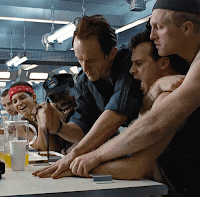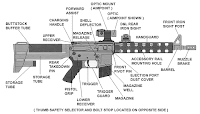Hey! Wanted to thank all of you who came out last weekend to the Writers Coffeehouse. Hopefully hearing me talk about writing in the real world was at least as semi-useful as all of this.
Also—shameful capitalist plug—my new book,
Ex-Isle comes out next week from Broadway Paperbacks. Check out that fantastic cover over there on the right. It’s book five in the ongoing
Ex-Heroes series, and I happen to think it’s pretty cool. Granted, I might be a bit biased…
(the audiobook’s still three weeks out but it is coming, I promise)
Anyway, enough about that. Now… story time.
About fourteen years ago some friends and I were in a pretty serious car crash. Someone sideswiped us as we were pulling onto the freeway and then sped off. My friend’s SUV was slammed into the concrete wall, bounced off, then slammed into the wall again because the wheels had twisted around to send us right back into it. We skidded ten or twenty feet scraping against the wall. The first impact was so hard that the passenger side door crumpled in, hit me, and fractured my ribs on that side. I also caught half the windshield with my face. I remember clenching my eyes shut on instinct, what felt like gravel hitting my cheeks and mouth and forehead. While part of me knew (in the greater sense) that we were in the middle of a collision of some kind, another part of me was still trying to figure out what the hell was going on. And there was so much noise. Screams and hollering from friends, metal on concrete, metal bending, glass breaking, highway noise because the windows were gone. It wasn’t until everything stopped that I realized how loud it had been.
Now, I took a while to write that out, and a while for you to read it, but the truth is, it took seconds. Six or seven seconds, tops. Really, at the moment, it was just a blur of sensations. I didn’t piece together what had happened—and what I’d experienced—until afterwards.
Action, by its very nature, is fast. It’s a blur. If you’ve ever been part of an accident of some kind, a fight, a collision, or any other kind of really dynamic moment, you know what I’m talking about. A huge amount of action is stuff we figure out after the fact. In the moment, I’m not quite sure how my shirt got ripped or why my arm’s bleeding or… oh, geez, I think I whacked my head a lot harder that I thought.
Here are a couple of tips on how I try to make my action scenes seem fun and cool.
Keep it fast–Action can’t drag. If it takes a full page for someone to throw a punch and connect, things are happening in slow motion. Even a paragraph can seem like a long time, especially once multiple punches are thrown.
He slammed three fast punches into the other man’s kidney.
Karen did something quick with her hands, and now she held the pistol while the mugger wailed and held his wrist.
Keep it simple—I practiced martial arts for a while and I also have a lot of experience with weapons
thanks to my time in the film industry. Even though I know lots and lots of terminology,
I try not to use it. That kind of thing can clutter up an action scene, especially when I’m using a lot of foreign languages or obscure terms. I want this to move fast, and if my reader has to stop to sound out words and parse meanings from context… that’s breaking the flow. If they need to figure out if a P-90 TR is a rifle, a pistol, or a fitness program… well, maybe they’ll come back to it after lunch.
Remember, there’s nothing wrong with terminology, but there’s a time and a place for everything. That time is rarely when someone’s swinging a baseball bat at your head.
Keep it sensory—Kind of related to the above, and something I touched on in my story. Action is instinctive, with a certain subtlety to it. There isn’t a lot of thought involved, definitely not a lot of analysis or pretty imagery. Keeping in mind the fast, simple nature I’ve been talking about, I try to keep action to sounds, sights, and physical sensations. I can talk to you about a knife going deep into someone’s arm, severing arteries and veins as it goes… or I can just tell you about the hot, wet smell of blood and the scrape of metal on bone. Which gets a faster reaction?
Granted, writing this way does make it hard to describe some things, but a lot of that gets figured out after the fact anyway. My characters will have a chance to sort things out once things cool down.
Keep it real—Like so many things in fiction, it all comes down to characters. There’s a reason we can zone out dozens of attacks on the news but be gripped by a single one in a book. Action needs to be based in real characters because my readers
need to care about the people involved. A stranger in a car crash is kind of sad in an abstract way, but Wakko in a car crash is a tragedy and we want constant updates.
This also kind of works against the idea of “always start with action,” which is
something I’ve talked about before. It’s tough for readers to be invested in action when we don’t know the people involved. If I start with an action scene it has to be twice as big to compensate for the fact that we don’t know the characters, and once it’s that big
it’s going to effect the level of everything that comes after it.
Now, as always, it’s pretty easy to find exceptions to these. As I said, these are more tips than rules. But there’s one particular exception I want to talk about.

A pretty common character is, for lack of a better term, the fighting savant.
Batman, Jack Reacher,
Melinda May, Ethan Hunt,
Sarah Walker, Joe Ledger,
Stealth—characters who’ve taken physical action to an art form through years of study and experience. For these people to not use precise terminology for weapons or moves could seem a little odd. It makes sense they’d be able to dissect action, picking out the beats and planning out responses like a painter reviewing their palette.
But…
Keep in mind, these characters by their very nature should be rare. If I have a dozen utterly badass characters who all have badass moves with badass weapons… that’s going to get boring real quick.
It’s monotone.
Also, keep the point of view in mind while writing. Stealth may be a trained master of unarmed combat, but St. George gets by with his invulnerability and raw strength. Whose narrative this is will affect how her actions are seen by the reader.
And that’s that. A handful of tips for writing killer action.
Next time, I’d like to talk about, arguably, one of the finest episodes of Star Trek: The Next Generation that was ever produced.
Oh, and next Thursday I’ll be at Mysterious Galaxy in San Diego, blabbing away and signing copies of Ex-Isle. If you’re in the area, please stop by and say “hullo.”
Until then… go write.
 Now, with that in mind… I’d like to repeat a little experiment I did for some of you a few years back. Please pay close attention to the following paragraph. Don’t write anything down, but try to keep a lot of it in mind. There’ll be questions afterwards.
Now, with that in mind… I’d like to repeat a little experiment I did for some of you a few years back. Please pay close attention to the following paragraph. Don’t write anything down, but try to keep a lot of it in mind. There’ll be questions afterwards.








